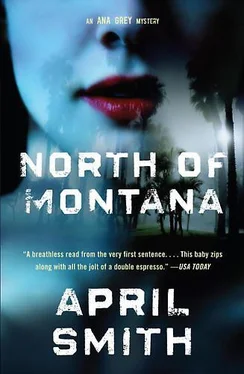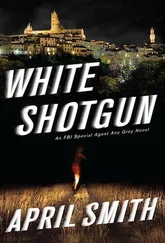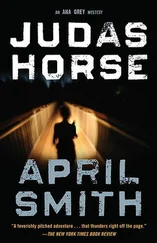Of course on this scale of house there is no doorbell — instead, a security system, with a square white button to push and a speaker to talk into.
“Yes?”
“Hello, my name is Ana Grey. I’m looking for Claire Eberhardt.” Since this is not government business I do not identify myself as a federal agent.
“This is she.”
“I’m a … friend … of Violeta Alvarado,” still speaking into the microphone. “Could I talk to you?”
Pause. “Violeta … doesn’t work here.”
I stifle the urge to say, Of course not, she’s dead. I am getting tired of talking to the wall.
“I know that. This will just take a minute, ma’am.”
“All right. Hang on.”
Silence. She’s coming. Which gives me the opportunity to study the front door — four feet wide and twice as tall as normal with a crescent-shaped window over the top, dark wood, mahogany maybe with some sort of finish intentionally scratched up. Just as I am wondering why anybody would need such a huge door, it opens.
She is holding a boy about two years old who is resting his head against her bare neck.
“Peter just woke up from a nap,” she explains, pivoting so I can see Peter’s flushed cheek and glossy eyes. They both have shiny black hair, so dark it almost has shades of eggplant purple, the boy’s in long loose curls, hers sticking out in all directions from a pink elastic band pushed up off the forehead as if she just wanted to get her bangs out of the way.
“I’m Claire.” She is wearing a gray hooded sweatshirt with the sleeves cut off and baggy turquoise cotton tights meant to hide a few extra pounds. Her breasts are loose. Even with the crazy hair and padded hips she is attractive in a reckless sexual way; but her looks are a neglected afterthought, as if it is enough that she’s made it from wherever she came from, she lives north of Montana. Although she seems as if she’s been napping along with her son, she is wearing strawberry-red lipstick. My first impression of Claire Eberhardt is that she is as unfinished as her house.
You’d expect her to take up the doorway with ownership and conviction, but instead she is backed up inside, curved around the child, unsure. She seems to be looking at me but away at the same time.
“Sorry to barge in on you, but it’s about Violeta Alvarado.”
“What about her?”
“Did Ms. Alvarado work here?”
“Yes. Until about three months ago. We had to let her go.”
“Why was that?”
She cocks her head in a peculiar manner as if staring down at a corner of the doormat. “It just didn’t work out.”
“How long was Ms. Alvarado employed here before you let her go?”
“Almost a year. Why?”
She shifts the boy to her other shoulder and faces me directly. Now I see the reason for the strange bearing: the left eye turns out slightly, enough to give an off-centered look of which she seems to be extremely self-conscious.
“I’m afraid I have some bad news.”
“Bad news?”
“Violeta Alvarado was killed.”
Suddenly the child seems too heavy for her. She turns and calls, “Carmen! Por favor!” in the worst Spanish accent you can imagine.
A tiny brown grandmother appears, right out of the Andes. She grins with gold teeth and reaches for the boy, who clings to his mother’s neck. They have to pry his hands apart. He starts to wail. The grandmother, still smiling, whispers soothing words I can’t under stand and bears him away, still crying fiercely, arms outstretched toward his mom.
Claire Eberhardt closes her eyes to her son’s distress and turns back to me, clearly shaken.
“How did it happen?”
“A drive-by shooting. About two weeks ago.”
“She was shot to death?”
I nod.
She props an elbow against the doorjamb and pulls off the elastic band, running a hand through her bangs, then clamping down tightly as if she’s going to pull out her hair. As it falls into place I see that actually she has a shoulder-length precision haircut and is wearing a diamond wedding band.
“Jesus fucking Christ.”
Despite the diamonds and the do, this is not a lady of culture.
“Excuse me, but — Jesus Christ. She had kids.”
“I know.”
She stays that way, gripping her hair, staring down at her bare feet.
“I’m a nurse. I mean, I haven’t worked since we moved out from Boston, but I’ve seen …,” her voice trails off, “in the ER … what it’s like when someone is shot.”
She is a nurse. I am in law enforcement. She lives in this house now, she has servants now, but maybe we are not so far apart. We both serve the public. We are both in the business of order and repair. She gazes up and for a moment I am able to hold her look in mine. One thing we share is professional knowledge; we have both seen what a young woman’s body looks like after it has been decimated by bullets.
“You’re her friend? It must be pretty bad for you, too.”
Embarrassed because it’s not as bad as it probably should be, “I’m trying to help out because of the kids. Somebody told me you owed Violeta money.”
“I wouldn’t know about that.”
“When she left. About four hundred dollars.”
“My husband took care of paying her.”
“Would you like me to talk to your husband, then?”
“I would really like you … to just go away.”
She gives me a half-assed smile as if I’m supposed to graciously understand her confusion and shock. But I don’t understand, because there’s something else going on here, something much deeper.
“You seem upset, Claire.”
The tip of her nose is red and moist, eyes bright with tears. She shakes her head and looks up at the sky as if to contain them. “Did you ever make a really bad mistake?”
“I never make mistakes,” I say. “I’m a perfect person.”
She appreciates that and it opens her up. “I used to drink a lot in high school,” she goes on, “I could do Southern Comfort all night long and wake up in the morning fresh as a daisy.”
There’s something fresh about her still. Maybe it comes from the creamy pale skin and light freckles, but she seems unguarded and direct, as if after one beer she’d tell you her whole life story and you’d be interested because there wouldn’t be any crap.
“We used to party, it didn’t matter with who, we used to skip school and go to Revere Beach — no matter what you did, you could get away with it. But then there’s the one guy you really fall for, and he’s always a mistake. Does that kind of thing ever happen to you?”
She makes me think of John Roth and I blush.
“Once or twice.”
“Did you get away with it?”
I reply with a wry look. “That remains to be seen.”
Suddenly her fingers form a fist and she gives the mahogany door frame a good pop. I wonder if her husband, the hapless sap who paid for the multimillion-dollar house, was the mistake she’ll never get away with.
“I wouldn’t hit that too hard,” I advise. “They don’t build houses like they used to.”
She smiles. “Hey, we’re in California. Isn’t it all supposed to fall apart?”
I return the smile. “What else about Violeta?”
“She was a very sweet girl.”
“Do you think she was involved with drugs?”
Claire Eberhardt seems shocked. “No, not at all. Never. She was straight as straight could be. A real Catholic.” She tries to laugh. “Not like me.”
“Then why did you fire her?”
In an instant the openness dries up. As direct as she can be, I see also that Claire Eberhardt can take on a stony working-class defiance. I’ve crossed some line of propriety and there’s no going back; she’s simply through talking to me.
Читать дальше












